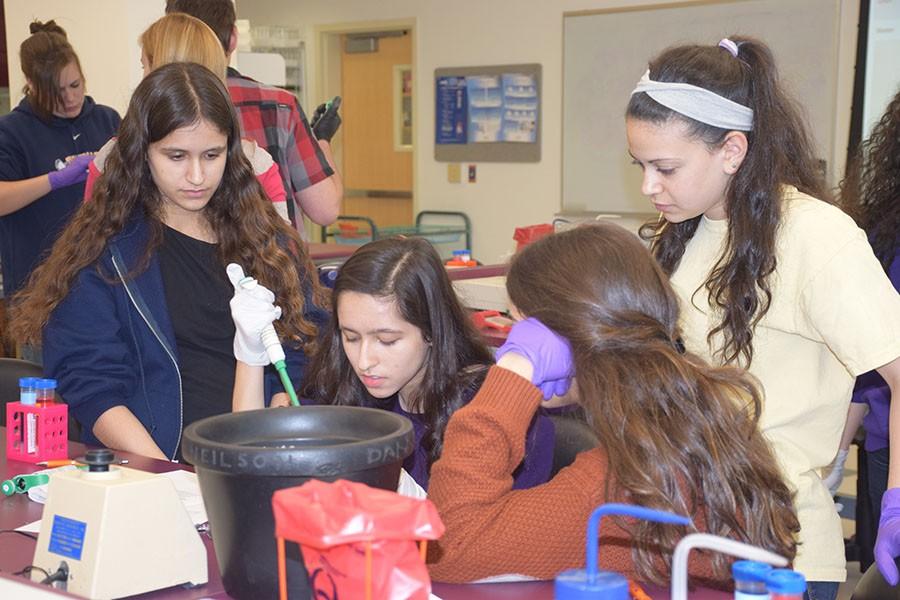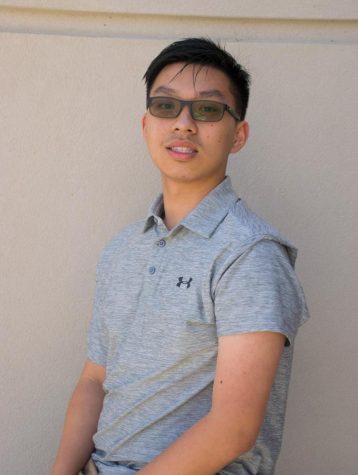On Nov. 23, students from the AP Biology class and the Forensic Science class journeyed to the University of Florida in Gainesville. They were in for a special treat, as they ventured to the biotechnology labs at the university’s Interdisciplinary Center for Biotechnology Research (ICBR). The school was invited by Florida’s Center for Precollegiate Education and Training (CPET) to be a part of the Special Explorations for Teachers and Parents (SETS) program.
The SETS program allows teachers to bring their high school students to a custom designed science experience. Students who take part in the program work with UF’s faculty, staff and students in order to explore current research concepts, applications and possible careers in the science field. Furthermore, the program gives students the opportunity to use authentic research equipment in laboratories. The Advanced Biotechnology and DNA Science explorations were conducted in the teaching laboratory at the UF Cancer and Genetics Research Complex.
Science teachers Paula Phillips and Carrie Lopez were excited to supervise the school’s inaugural trip to the Biotechnology labs. Lopez’s Forensic Science class has taken a trip to the university before for a different program, but never to visit the biotechnology labs.
“I’m excited about doing this lab with Mrs. Phillips because the kids actually get to do what’s called a PCR analysis,” Lopez said.
Phillips, however, has never taken an AP Biology class on a field trip.
“[The students were] thrilled. They [felt] like pioneers,” Phillips said.
Students from the AP Biology and Forensic Science classes both completed a polymerase chain reaction (PCR), but from different perspectives. This reaction allows students to take a very minute amount of recovered DNA and amplify the amount of DNA of that tiny sample. It allows them to perform tests on the DNA without degrading the original sample, while also expanding the amount of DNA available.
Both the AP Biology classes and the Forensic Science class investigated the DNA recovered from a crime scene. The investigation required the use of the PCR process in order to determine the culprit of the crime. PCRs require a special type of equipment not available on Trinity’s campus. This equipment, the thermal cycler, is available in UF’s biotechnology labs.
The students’ experiments at the university directly correlate to the information they are learning in class. The AP Biology core curriculum framework includes learning about the current technologies that contribute to the advancement of Genomics.
“[There are technologies in] Genomics today that we couldn’t do 20 years ago because we didn’t have the technology,” Phillips said.
The PCR and thermal cycler are just a few of the many technologies that the students are required to understand for the class. This trip helped the students understand what can be achieved in Genomics through modern technology. The classes were able to better understand these Genomic technologies by actually using the technology itself.
“It’s one thing to hear how to amplify DNA. It’s another thing entirely [for them] to experience the amplification process themselves,” Phillips said.
The Forensic Science class was learning how to analyze DNA evidence from a crime scene prior to the trip.
“Everyone understands where DNA comes from, but [many] don’t understand what is done to it [once it arrives at the laboratory],” Lopez said. “ [The trip was] a live application of what they learned about [in class].”
The PCR process is a rather long and complex. The class had all day at the laboratory to complete the process, instead of one class period.
Finally, the visit also helped the teachers when they returned to the classroom. The teachers were able to see what type of research is being conducted in a professional laboratory setting. They were discussed with other professionals in their respective fields about advanced topics.
“We [as teachers] are not in the [research] lab everyday like that,” Lopez said. “It is good for us to see [the modern research being conducted]. It creates discussion in our classes about those kinds of topics.”
Meanwhile, Phillips agreed that the visit supplemented her teaching and helped the students.
“The kids [have] asked: ‘Hey I have a real interest in Biotechnology…What could I actually do with that?…What kind of active research is being done right now?’ ” Phillips said.
Phillips and Lopez also agreed that both the real-life application and the textbook are essential teaching tools. Both methods are interdependent upon one another. The textbook is required for students to have background information and a basic knowledge regarding biotechnology. The real-life application is necessary to help deepen the student’s understanding of biotechnology by actually having the student apply it himself and showing the student the practical means of biotechnology.
“If they hear about the biotechnology it is hard for them to conceptualize what is actually happening until they can actually do it themselves,” Phillips said.
Senior Amanda Rivas is a student in both AP Biology and Forensic Science. She describes how the trip helped her in both classes.
“The kids in the AP Bio class all got closer,” Rivas said. “Find[ing] out who the real suspect was [in the lab] tied back into the Forensic Science aspect. [We] actually did an experiment but then applied it to a real situation.”
The UF trip benefited both the students and the teachers. The school plans to attend future trips.




